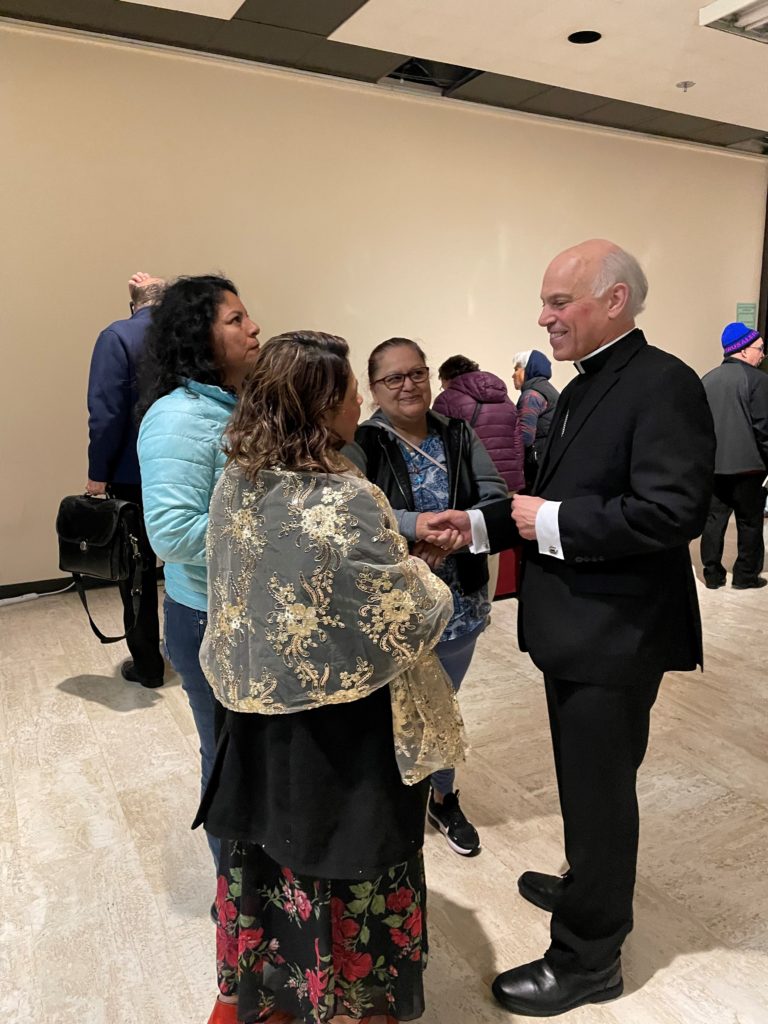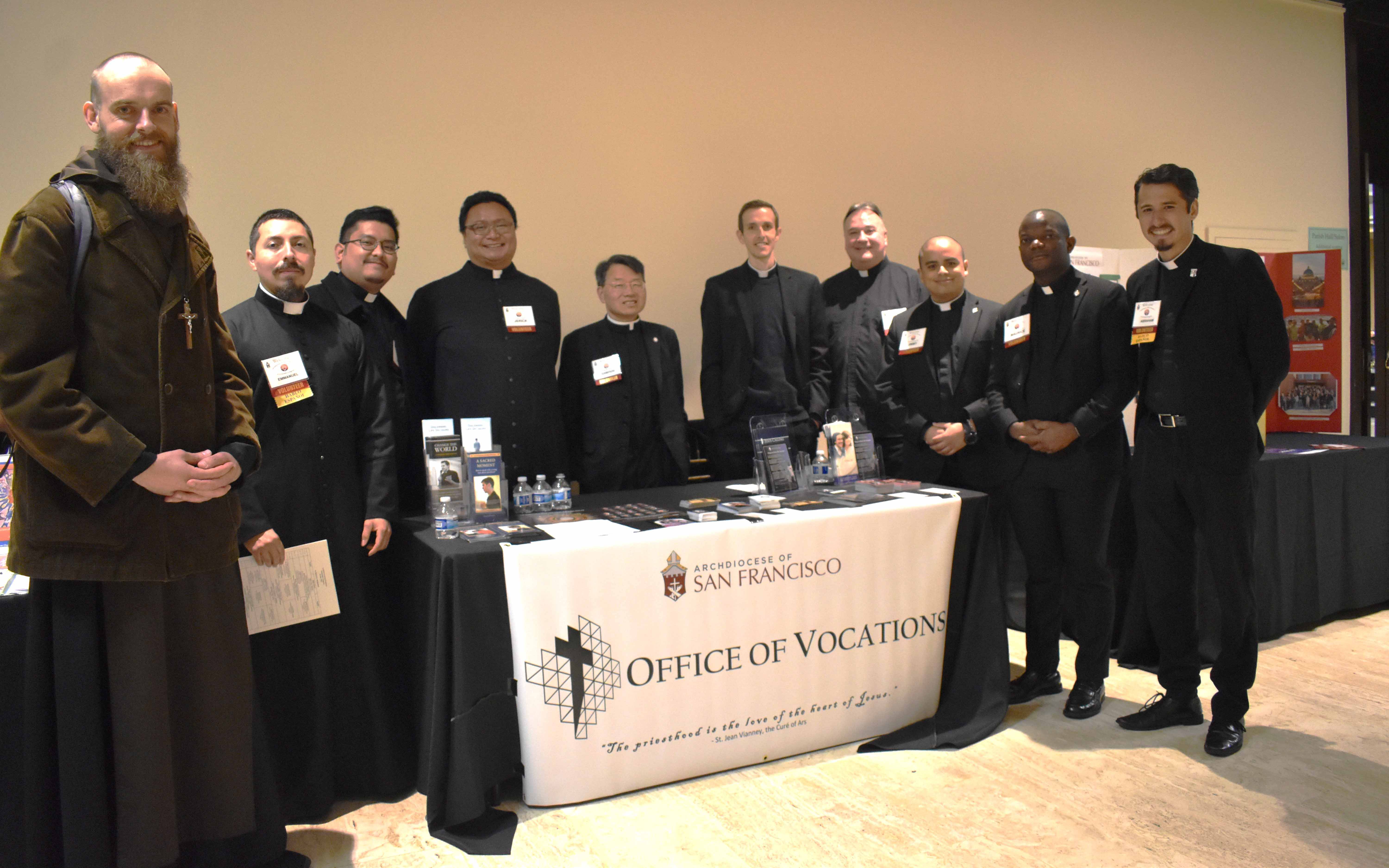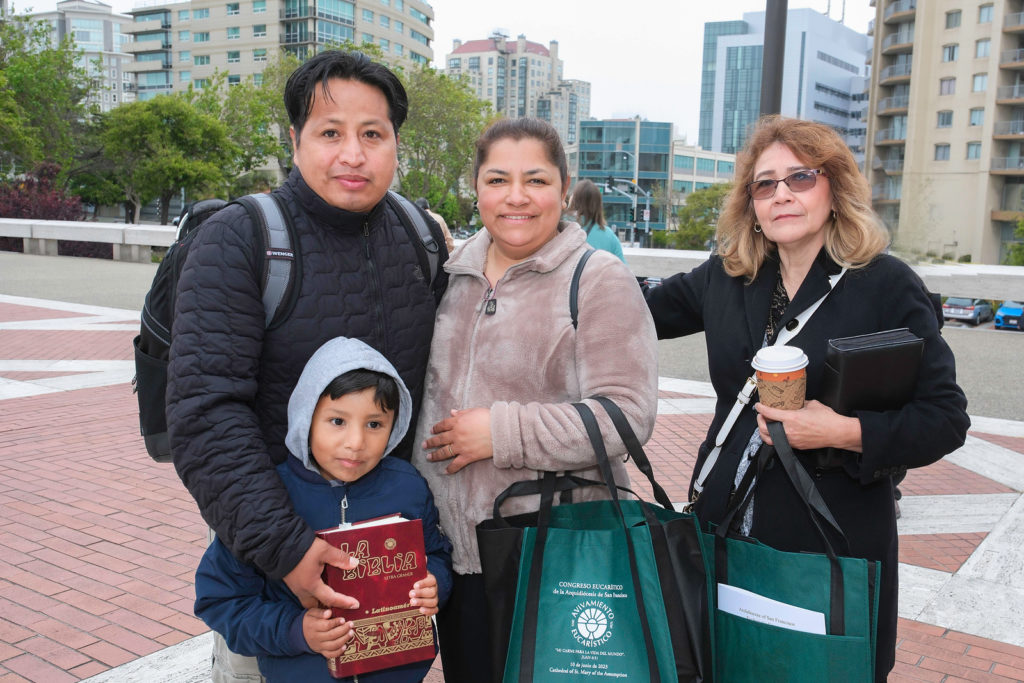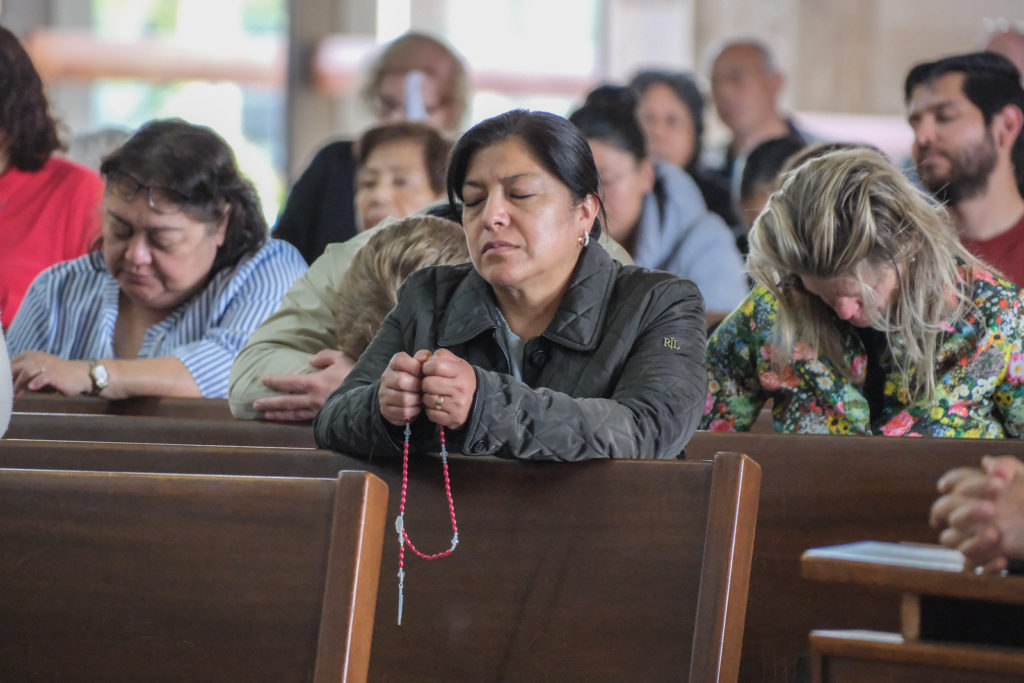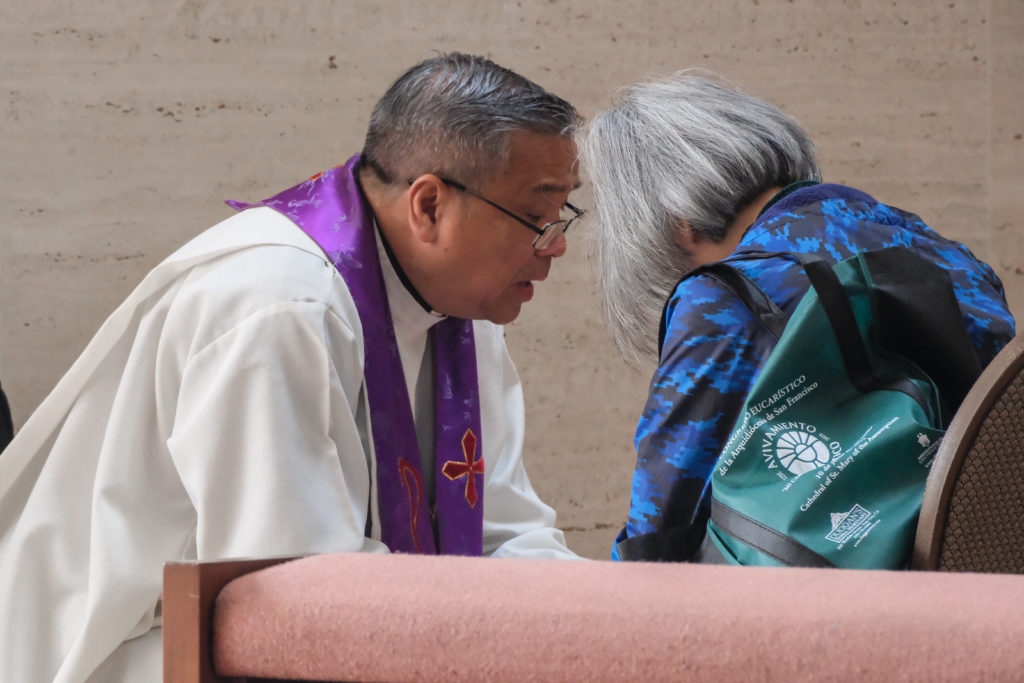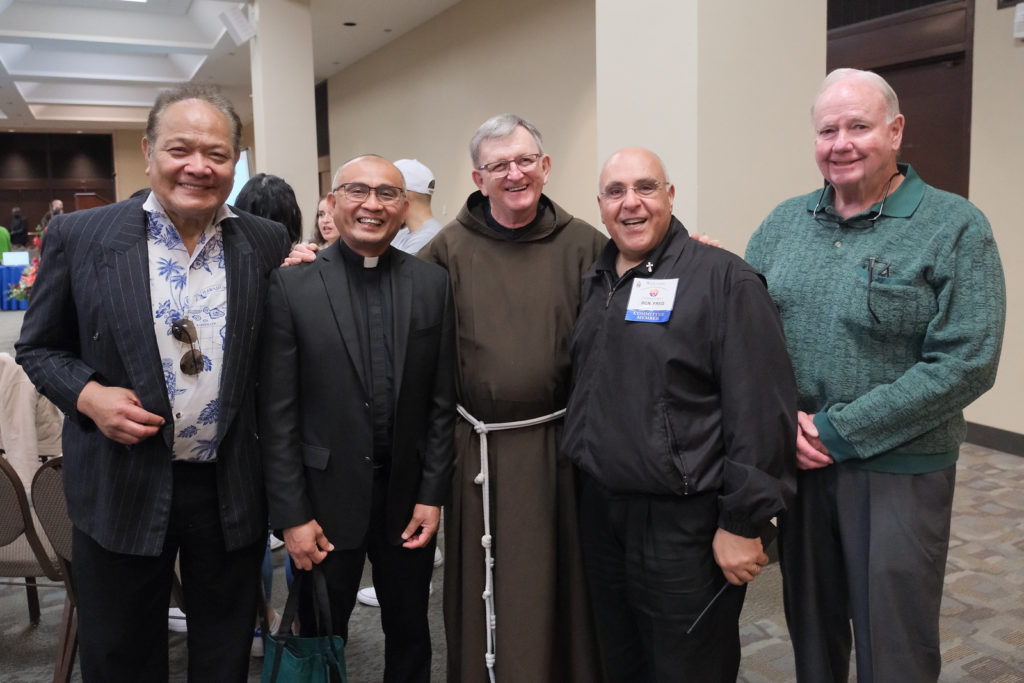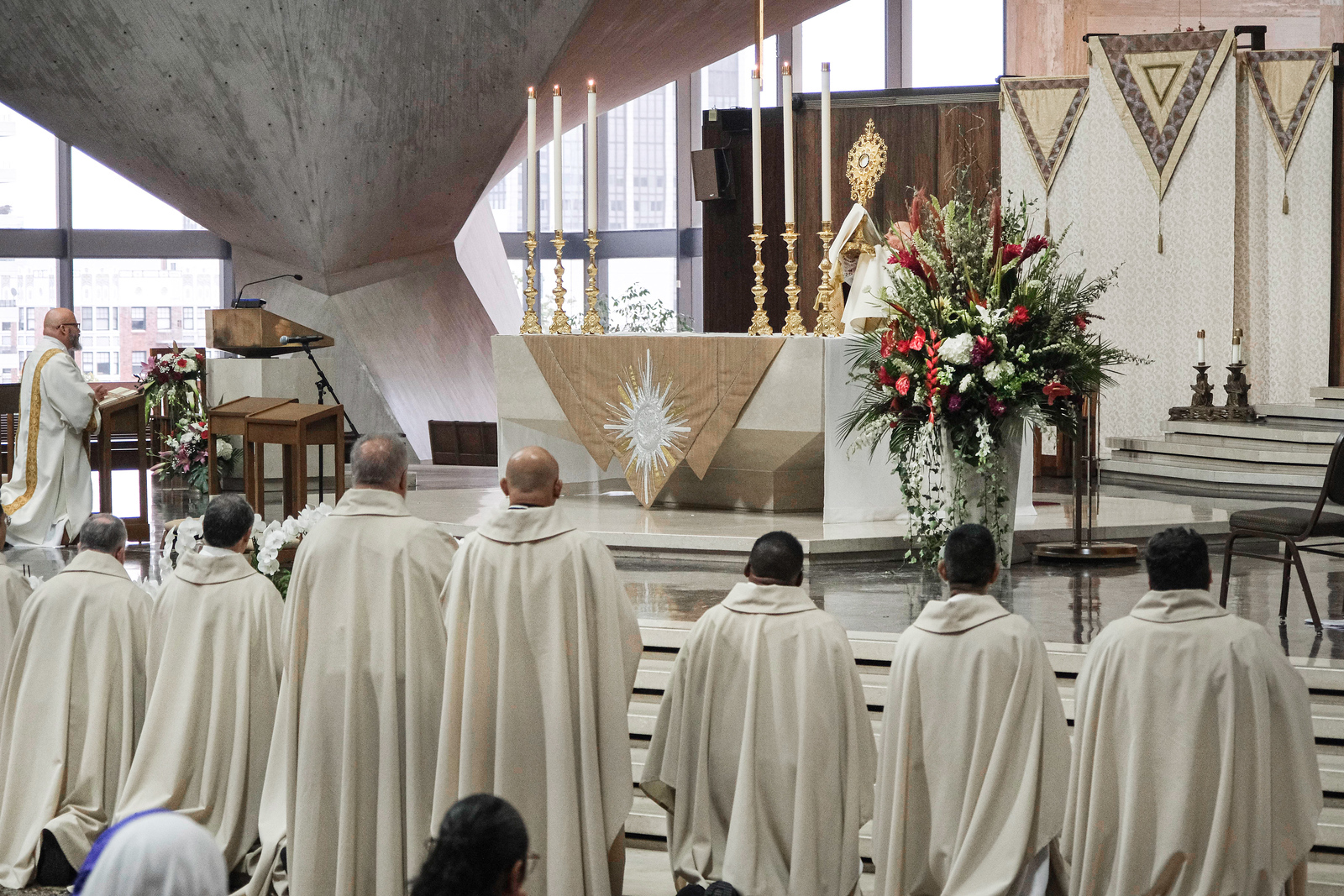
Eucharistic Congress draws more than 1,500 faithful to St. Mary’s Cathedral
By Christina Gray
The heart of the Catholic faith — the Eucharist — was explored, experienced, and reverenced by more than 1,500 people at a day-long Eucharistic Congress at St. Mary’s Cathedral on Saturday, June 10.
The Archdiocese of San Francisco organized the bi-lingual Congress featuring Eucharistic preaching from more than 10 speakers, followed by Eucharistic adoration, Mass and Eucharistic procession as part of the National Eucharistic Revival. The day also included the Sacrament of Reconciliation, musical meditation provided by the Benedict XVI Institute, and 22 exhibitors featuring all things Catholic and ways for people to engage in apostolates and ministries across the Archdiocese.
“Eucharistic Revival is all about falling more in love with Jesus in the Eucharist”
Most Rev. Donald Joseph Hying, Bishop of Madison, Wisconsin
The National Eucharistic Revival was conceived by the U.S. Bishops and launched in dioceses across the nation last year on the Solemnity of the Body and Blood of Christ (Corpus Christi). It is a three-year grassroots movement to elevate the core Catholic belief that Jesus is truly present in the Eucharist.
A 2019 Pew Research Center study revealed that nearly 70% of self-identified U.S. Catholics polled believed that the bread and wine used at Mass are mere “symbols of the body and blood of Jesus Christ.” The Eucharistic Revival aims to create at both local and national levels encounters for the faithful to grow in their understanding and devotion to the Real Presence of Jesus in the Eucharist. Pope Francis describes the Revival as “a renewed personal encounter with Jesus Christ,” particularly through the transforming power and mercy of Jesus in the Holy Eucharist.
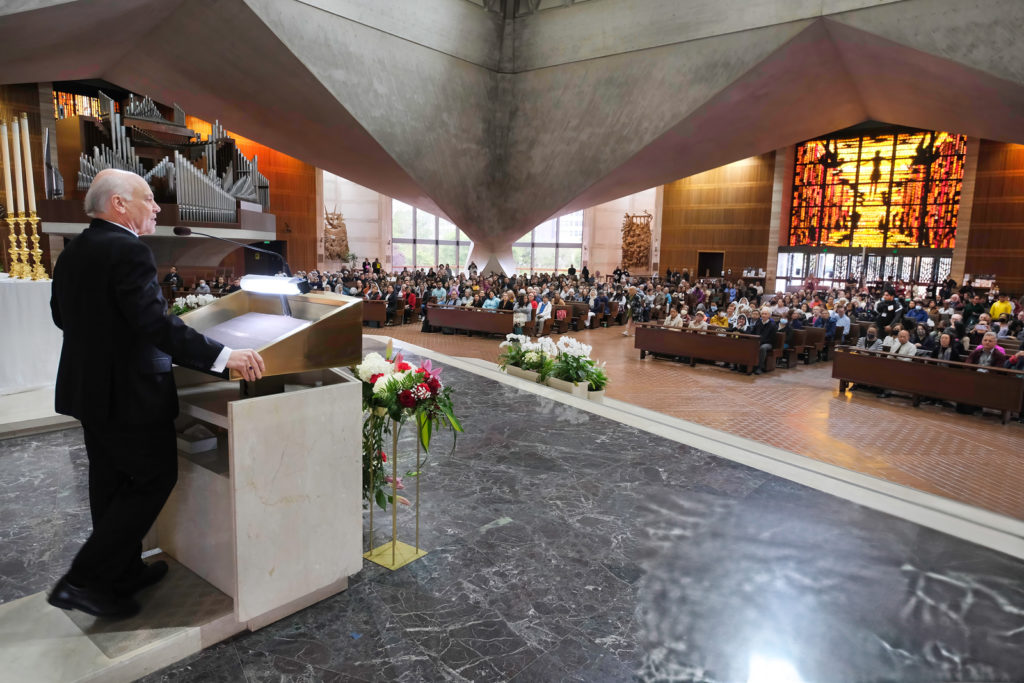
Opening the Congress with prayer in the packed cathedral was San Francisco Archbishop Salvatore J. Cordileone, who expressed gratitude to the U.S. bishops for prioritizing the project aimed at “reviving Eucharistic faith among our Catholic people.”
“This is really at the heart of our identity as Catholic people,” he said. “We’re Eucharist centered. We know this is Christ’s body, blood, soul, and divinity.”
Most Rev. Peter J. Sartain, Archbishop Emeritus of Seattle, was the English-language keynote speaker, and addressed the Revival’s theme — “My Flesh for the Life of the World” — in both morning and afternoon sessions.
“We are here today because we as individuals, and also because we as a church, need a rededication to the reality of the Lord’s body and blood given to us in sacrifice on Calvary and every time we receive Holy Communion and participate in Mass.”
Most Rev. Archbishop Peter J. Sartain, Archbishop of Seattle
Most Rev. Donald Joseph Hying, Bishop of Madison, Wisconsin, offered the Spanish-language keynote.

“What a joy to see the faith of so many good Catholics here in the Archdiocese sharing their love for the Lord in the Eucharist,” Bishop Hying said. “Eucharistic Revival is all about falling more in love with Jesus in the Eucharist. Each one of us is sent to be a witness to the power of the Eucharist.”
Bishop Hying challenged attendees to think of people in their lives who have drifted away from Mass.
“How can we witness to them the necessity of coming to Mass in order to know the joy, the salvation, and love of Jesus spoken in His word celebrated in the Sacrament?” he said.
Archbishop Sartain said we as Catholics are defined as “sacramental people.” The Eucharist, he said, “makes us who we are.”
“We are here today because we as individuals, and also because we as a church, need a rededication to the reality of the Lord’s body and blood given to us in sacrifice on Calvary and given to us every time we receive Holy Communion and participate in Mass,” he said. “We need to be reawakened to its gift.”

He explained the centrality of the Eucharist through the words of two early Christians who continued to practice their faith in defiance of Roman Emperor Diocletian (284-286 AD). They were discovered and eventually martyred.
When questioned why they would disobey the orders of the emperor, one among the group of 49 said: “Don’t you know that it is the Sunday Eucharist that makes the Christian, and the Christian that makes the Sunday Eucharist. One cannot subsist without the other.”
Another offered that, “Without Sunday, we cannot live,” a statement of faith that foretold his execution.
Archbishop Sartain said sacred scripture makes clear that Jesus Himself is peace, the promised gift of the Father, and “the long-awaited shalom.”
God’s “loving plan” was to come after us through His Son, “even when we walked away from Him,” he said. “He came to get us in the most radical and complete of ways.”

“Every time we participate in the Holy Eucharist and receive the Lord’s body and blood, we are receiving the fullness of that gift of shalom that Jesus Himself won for us,” he said.
Dr. Scott French, a practicing emergency room physician, was among the morning lineup of speakers. French spoke on “21st Century Eucharistic Miracles.”
Eucharistic miracles are phenomena such as consecrated hosts visibly producing blood from the inside out, transforming into heart tissue, being preserved for extremely long time periods, or remaining intact even when thrown into fire.
“Every time we participate in the Holy Eucharist and receive the Lord’s body and blood, we are receiving the fullness of that gift of shalom that Jesus Himself won for us.”
Dr. Peter French, emergency room physician
“Prior to the 21st century, there were plenty of Eucharistic miracles but not the science to prove them,” said French, who showed images of such miracles, notably blood seeping from the center of the Eucharist held above a chalice by a priest.
French linked the alarming rise of suicide, depression, and other behavioral disorders in youth he sees more and more often in the emergency room, to relativism and secular belief that science and faith are incompatible.
“The Eucharist is the medicine of immortality,” he said. “We have lost that if 70% of Catholics don’t believe in the Real Presence.”
Other morning presentations included Hector Molina, who spoke on “Eucharistic Typology: The Hidden Manna Revealed.” Husband and wife presenters Carlo and Thea Fiatarone, spoke to youth on “God’s Love Made Visible,” and Jesse Romero offered in Spanish, “La Eucarista: La Medicina de la Inmortalidad.”
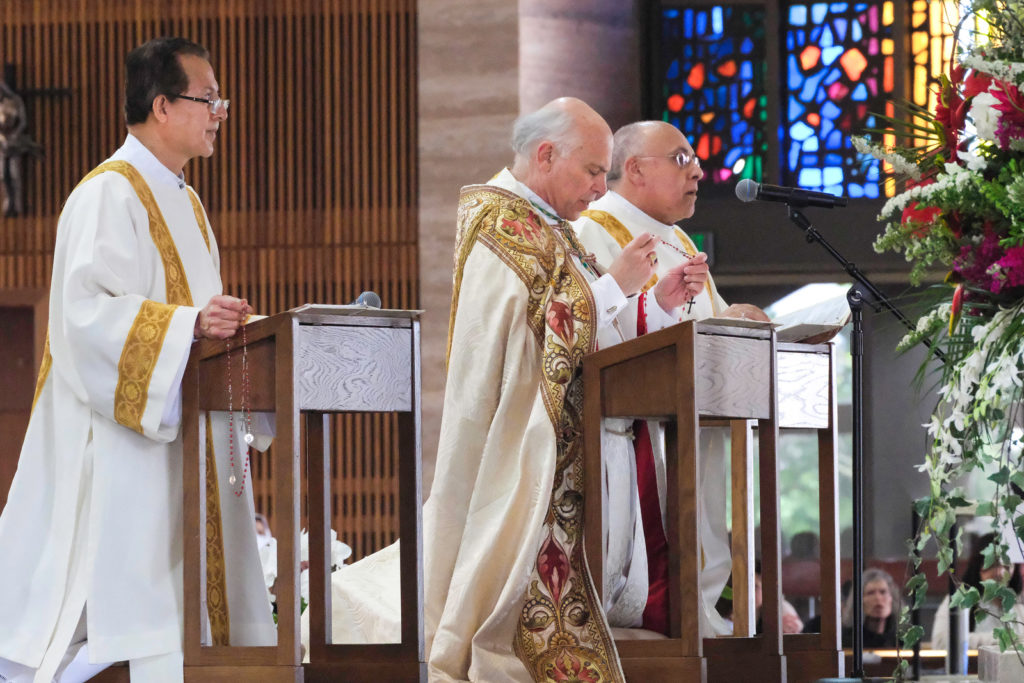
After lunch, attendees made their way from the event halls back to the Cathedral for a Holy Hour led by Archbishop Cordileone. The Holy Hour generated the largest crowds of the day, and the faithful engaged in Eucharistic hymns and prayed the Rosary for an increase in vocations to marriage, the priesthood, and religious life in the Archdiocese of San Francisco.
Afternoon speakers included Father John Trigilio, Jr., whose presentation, “Stay with Us Lord,” drew upon Luke 24:29 and the disciples who encountered the risen Lord on the road to Emmaus. Simone Rizkallah spoke on “The Eucharist and the Epidemic of Loneliness.” Braden Johnson spoke to the youth on “The Bread of Life,” and Vicente Del Real offered in Spanish, “La Eucharist Como Fuente de Tranformacion en Nuestra Vida.”
“This is what we are doing today, holding up our Eucharistic Lord in the heart of the city named after His great servant Francis, to reclaim our city for true love of God.”
Archbishop of San Francisco, Salvatore J. Cordileone
At multiple points during the day, attendees had opportunities to participate in the Sacrament of Reconciliation. The Congress ended with a Mass, Eucharistic procession and Benediction.

In his homily, Archbishop Cordileone reiterated the importance of living a Eucharistic life — not just in worship, but also in the world.
In speaking of the city’s patron saint, St. Francis of Assisi, Archbishop Cordileone noted that, “We are having a Eucharistic revival because we need to reignite that true Franciscan spirit of piety, a piety not limited to one dimension or another of our faith, but true Eucharistic faith, a faith that recognizes both the Real Presence of Christ in the Eucharist and, because of that, His presence in the poor whom He calls us to love with His Eucharistic heart. “
Archbishop Cordileone continued, “This is what we are doing today, “holding up our Eucharistic Lord in the heart of the city named after His great servant Francis, to reclaim our city for true love of God and the poor that Francis so effectively modeled: that is, a life of reverence for the sacred.”
Christina Gray is the lead writer for Catholic San Francisco magazine.
Photos: Dennis Callahan, Archdiocese of San Francisco



